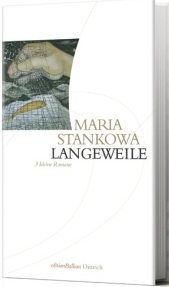
I’ve never read Bulgarian literature before and when Thomas (Mystwostotinki) announced he would host a Bulgarian Literature Month in June, I thought it would be a great idea to join him. Since I didn’t know any Bulgarian writers, I picked a book by Maria Stankowa (or Stankova) that had received praise by German critics when the translation came out in 2010. The book is called Langeweile – Boredom and consists of three novellas. One of which The Black Woman and the Archer I’ve read for Bulgarian Literature Month.
Maria Stankowa was born in 1956 in Burgas. She’s a musician, assistant director, and editor. She has written plays, scripts, and prose and is said to be one of the greatest writers of contemporary Bulgarian literature. The three novellas in Boredom tell stories of women in crisis. In The Black Woman and the Archer, a woman tries to break free from the boredom of a loveless marriage. When she meets her first love, she begins an affair but has to understand, that she’s not really able to love this man either. Instead, she moves on to the next man and we are led to believe that she’s not really able to love but loves being in love. The story explores marriage and relationships and turns a lot of the assumptions that people have upside down. It plays with clichés and stereotype and pairs those with new insights into gender relationships.
Not that much of a story and certainly not something I haven’t read before. What I haven’t read before though is Maria Stankowa’s style. It’s like nothing I’ve encountered before. It blends almost everything you could possibly blend. Straightforward story telling, myth, irony, metaphor, wordplay, poetry, lyricism. Nonetheless, there’s a unity of style. The novella wasn’t always easy to read but it had so many surprising elements, so many fresh and new ways of describing something, that I enjoyed it a great deal and will certainly read the others in the book as well.
Unfortunately, since I’ve read a German translation of a Bulgarian text, it’s not easy to convey her style but I’ll add two small quotes that I’ve translated from my German edition to give you at least a bit of an idea.
“. . .You can’t understand. You’re a woman . . . I have to go to work.”
“I’ll go with you.”
“That’s impossible. The wife has to stay at home. She has to take care of the house. And worry. You have to learn that – to worry. It’s very important.”
He left and she stayed at home and worried. The worries had only waited for that. They were crawling around everywhere. The black woman bought worry poison, swept them up, filled bags and carried them out of the house. But the worries didn’t diminish. And every morning the black woman asked the same question—shouldn’t she leave?
Once, a very long tome ago, he met a girl. She was his first girl. He was her first boy. Their love had been so clumsy and coy. They loved each other. Clumsily and coyly. When she left, she left behind the aroma of burnt grass and the decline of summer, a pain and the almost unbelievable feeling of being a man.
If Maria Stankowa is anything to go by, then Bulgarian literature has a lot to offer.
